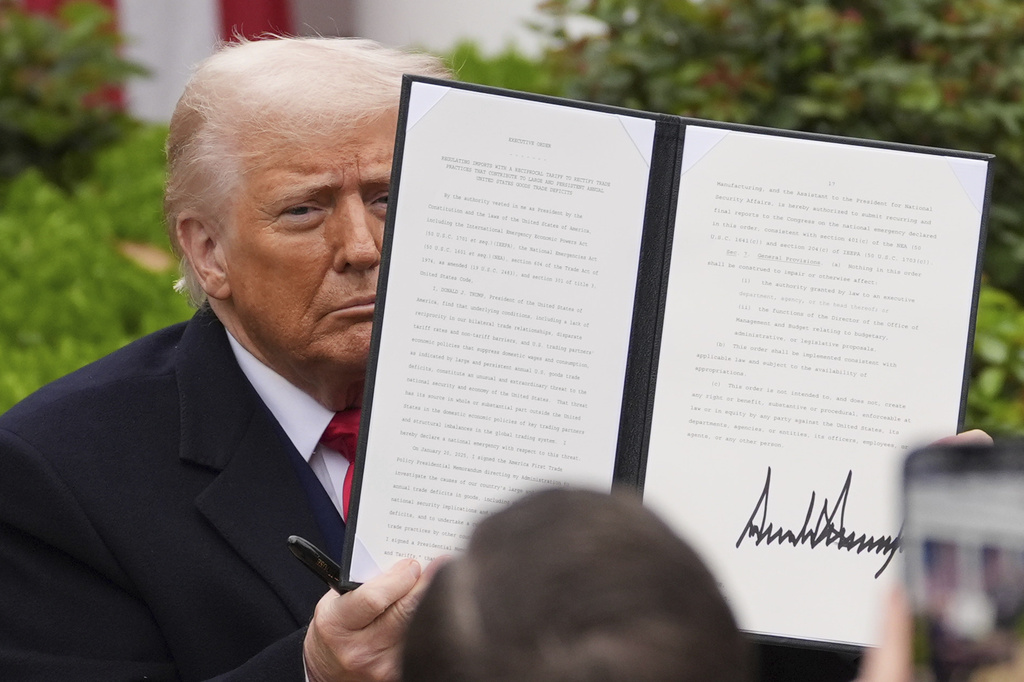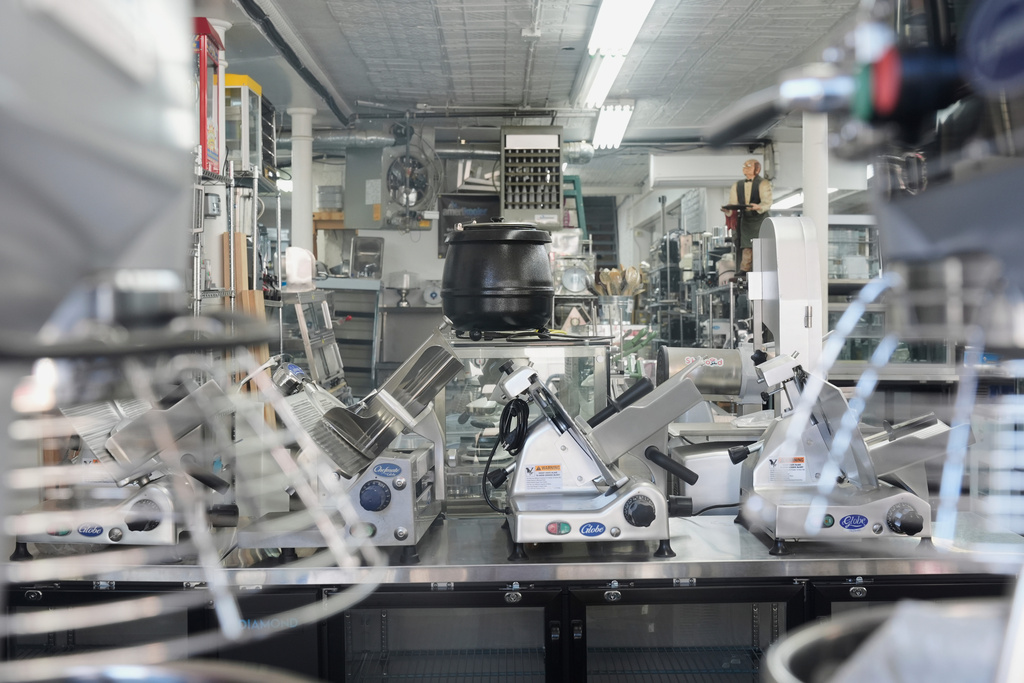(AP) – The new tariffs announced Wednesday by US President Donald Trump were met initially with measured reactions from key trading partners, highlighting the lack of appetite for a full-fledged trade war.
Trump presented the import taxes, which he calls “reciprocal tariffs” and range from 10 per cent to 49 per cent, in the simplest terms: the US would do to its trading partners what he said they had been doing to the US for decades.
European Commission President Ursula von der Leyen said they are a “major blow to the world economy,” while a Japanese official called them “extremely regrettable” and Korea’s prime minister called for emergency measures to support industries affected by the tariffs. Asian markets tumbled in Thursday morning trading.

Here’s the latest:
Thailand says it is ready to negotiate with US over trade balance
The Thai prime minister says her country is ready to negotiate with the US to find a fair trade balance for both sides, after Trump announced 36 per cent tariffs on Thailand.
Paetongtarn Shinawatra said Thursday that Thailand is committed to working with the US to achieve sustainable economic growth.
She added that Thai exporters should also look for additional markets for their products to reduce their risk of relying on one main market.
Indian analysts see opportunity in supply chain realignments
Indian exporters and analysts say Trump’s new tariffs are a mixed bag for the country.
Trump announced a reciprocal tariff of 26 per cent for India, as compared to 34 per cent for China, 46 per cent for Vietnam, 37 per cent for Bangladesh and 36 per cent for Thailand.
Observers said Thursday the move will likely impact Indian industry and pressure jobs, but that there is room for new business to come in since India is in a lower band than its Asian peers.
“These tariffs do present challenges, but India’s position remains comparatively favorable,” said S.C Ralhan, president of the Federation of Indian Exports Organisations.
Ajay Srivastava, a former Indian trade official and founder of the New Delhi-based think tank Global Trade Research Initiative, said the protectionist tariff regime could be a catalyst for India to gain from global supply chain realignments.
South and Southeast Asia are targeted with some of the highest tariff rates
Vietnam, Sri Lanka and other countries across South and Southeast Asia are the targets of some of the highest tariff rates.
Trump imposed 46 per cent “reciprocal” duties on goods from Vietnam, 49 per cent on products from Cambodia, 37 per cent on Bangladesh and 44 per cent on Sri Lanka.
The duties will affect domestic exporters to the US but also Chinese, Japanese and South Korean companies that have over the past few years shifted production to Southeast Asian nations to escape the trade frictions during Trump’s first term in office.
Automaker Stellantis will shut down its assembly plant in Windsor, Canada, for 2 weeks
Automaker Stellantis will shut down its assembly plant in Windsor, Canada, for two weeks from April 7, the local union said late Wednesday.
The president of Unifor Local 444, James Stewart, said more scheduling changes were expected in coming weeks.
“The company said there are multiple factors at play, with the primary driver behind the final decision being this afternoon’s announcement from US President Donald Trump of the US tariffs,” Stewart said. “This has and continues to create uncertainty across the entire auto industry. This is not just affecting our plant—it’s impacting facilities in the US and Mexico as well.”

EU leader says tariffs are a major blow to the world economy
European Commission President Ursula von der Leyen says the tariffs are a “major blow to the world economy.”
“The consequences will be dire for millions of people around the globe,” von der Leyen said. Groceries, transport and medicines will cost more, she said, “And this is hurting, in particular, the most vulnerable citizens.”
Von der Leyen acknowledged that the world trading system has “serious deficiencies” and said the EU was ready to negotiate with the US.
Japan’s chief cabinet secretary calls tariffs ‘extremely regrettable’
Japan’s chief cabinet secretary has called the tariffs “extremely regrettable,” saying officials thought the country deserved an exemption, after Trump slapped 24 per cent additional tariffs on Japan.
Yoshimasa Hayashi on Thursday also questioned whether the tariffs are compatible with Japan-US bilateral trade agreements and said the move would likely impact their economic ties, as well as the global economy and multilateral trade system.
He said Japanese officials are continuing to negotiate with Washington seeking an exemption. Asked if Japan would consider retaliatory tariffs or file complaints with the World Trade Organization, Hayashi declined to comment.
Asian markets tumble following Trump’s tariff announcement
Tokyo’s Nikkei 225 index dipped more than 3.4 per cent, while the Kospi in South Korea dropped 1.8 per cent. In Australia, the S&P/ASX 200 also sank 1.8 per cent.
US stocks whipped through another dizzying day before Trump’s unveiled the tariffs Wednesday. The S&P 500 rose 0.7 per cent, and the Dow gained 0.6 per cent. The Nasdaq composite surged 0.9 per cent.
Tesla swung from a sharp loss in the morning to a gain later in the day to help pull the market higher. Treasury yields also veered from lower to higher following a better-than-expected report on the job market.
South Korea prime minister calls for emergency measures to support industries affected by tariffs
South Korea’s acting leader called for swift emergency measures to support the auto industry and other businesses potentially affected by the Trump administration’s new tariffs, pledging full government efforts to address what he described as a looming “global tariff war.”
During an emergency government meeting, Prime Minister Han Duck-soo also instructed officials to work with business groups to analyse the impact of the US tariff increases and actively engage in negotiations with Washington to “minimise damage” to South Korea’s economy, the trade ministry said.
Han, serving as South Korea’s acting leader while President Yoon Suk Yeol remains impeached over his December imposition of martial law, convened the meeting with trade and foreign policy officials after Trump announced a 25 per cent tariff on South Korea.


